






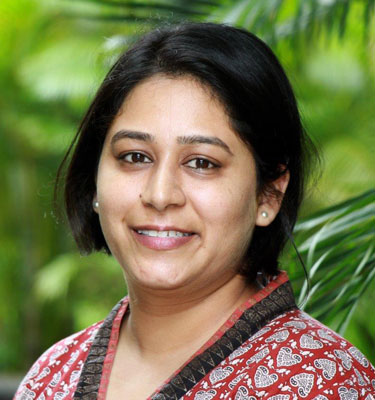


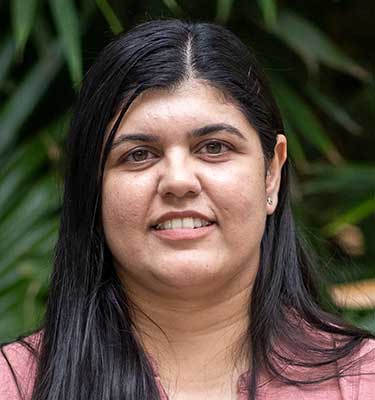


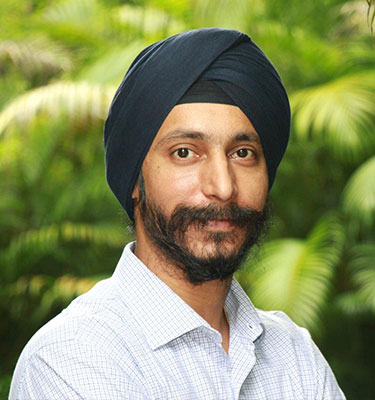

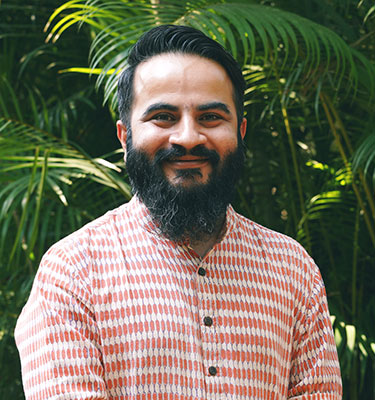









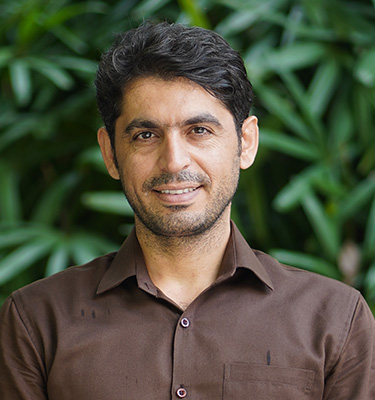







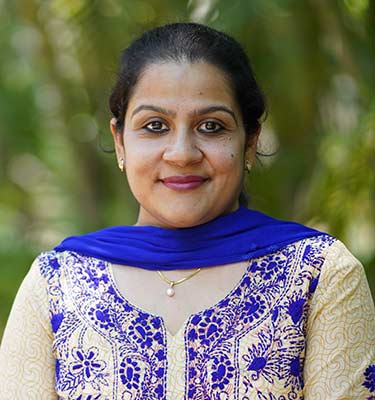






FACULTY

Prof. Smita Chaudhry
Prof. Smita Chaudhry is a faculty and Head of the Department of Human Resources. She teaches in undergraduate and postgraduate business management programs. She takes courses in the areas of Organizational Behavior, Leadership, Change Management, Team Building, Negotiation Skills and Conflict Management, People Management, Personal Growth and Organizational Theory. Smita is a doctorate in Organizational Behavior from the Indian Institute of Management Calcutta. Her thesis explores the cognitive, emotional, and behavioral response to partner opportunism in client-vendor relationships. She has published papers in a variety of research journals and presented them in international conferences. She is also certified in Hogan Leadership and Personality Assessment.
Prior to pursuing a Ph.D., Smita was engaged in process and information technology consulting for over ten years in one of the Big Four consulting firms. Her experience spans diverse sectors like education, utilities, engineering, manufacturing, consumer durables, FMCG, real estate, and finance. Smita is a postgraduate in management from the Indian Institute of Management Bangalore.
RESEARCH PUBLICATIONS
- Shalaka, S., Gandhi, P., Shinde, S. & Chaudhry, S. (2025). Unmasking the notion of ‘Supermom’ in India: Success and strain amongst earning mothers. Humanities and Social Sciences Communications, 12(1), 1-13.
- Bhandari, T., & Chaudhry, S. (2025). Inclusivity for a Diverse Workforce: Organizational Initiatives for a Sustainable Solution. Development and Learning in Organizations: An International Journal. Vol. ahead-of-print doi:10.1108/DLO-01-2025-0024
- Shalaka, S., Chaudhry, S., & Shinde, S. (2025). Supermoms - Tired, admired, or inspired? Decoding the impact of supermom beliefs: A study on Indian employed mothers. PLoS One, 20(4), e0321665.
doi: 10.1371/journal.pone.0321665 - Chhajer, R., Chaudhry, S., & Mishra, A. (2024). Combating the mental health challenge of loneliness among urban youth: could finding meaning in life and experiencing thriving enhance their well-being?. BMC Public Health, 24(1), 3586. doi: 10.1186/s12889-024-21185-2
- Chaudhry, S. (2024). Sustaining talent: a social exchange perspective on the Generation Z workforce. Development and Learning in Organizations: An International Journal, Vol. 38 No. 5, pp. 19-22. doi: 10.1108/DLO-11-2023-0245
- Chaudhry, S., Tandon, A., Shinde, S., & Bhattacharya, A. (2024). Student psychological well-being in higher education: The role of internal team environment, institutional, friends and family support and academic engagement. PLoS One, 19(1), e0297508. doi: 10.1371/journal.pone.0297508
- Chaudhry, S., & Chhajer, R. (2023). Enhancing psychological well-being of school teachers in India: role of energy management, thriving, and stress. Frontiers in Psychology, 14. doi: 10.3389/fpsyg.2023.1239587
- Chaudhry, S. (2023). Measuring diversity, equity and inclusion: a holistic approach. Development and Learning in Organizations: An International Journal, 37(2), 4-6. doi: 10.1108/DLO-04-2022-0068
- Chhajer, R., & Chaudhry, S. (2022). What makes Indian management students thrive? Role of decision-making discretion, broad information sharing, and climate of trust. Frontiers in Psychology, 13, 786. doi: 10.3389/fpsyg.2022.795262
- Chakrabarti, D., Shinde, S., & Chaudhry, S. (2021). Teaching non-written communication skills to MBA students through evaluated exercises. Journal of Organizational Behavior Education, 14, 143-162.
- Chaudhry, S. (2020). Understanding change enablers in service organizations: a contingency theory perspective. South Asian Journal of Management, 27(2), 54-83.
- Chaudhry, S. (2020). Exploring the determinants of client opportunism: A study of IT service projects. International Journal of Project Organisation and Management, 12(4), 407-427. doi: 10.1504/IJPOM.2020.111070
- Chaudhry, S. (2020). Partner opportunism and willingness to engage in project relationships. Journal of Strategy and Management, 13 (3), 413-432. doi: 10.1108/JSMA-11-2019-0200
- Chaudhry, S., Srivastava, B. N., & Joshi, C. (2020). The influence of justice perceptions and affective states on project managers’ responses to client opportunism. Project Management Journal, 51(3), 278-293. doi: 10.1177/8756972819851411
- Chaudhry, S., Srivastava, B. N., & Joshi, C. (2018). Vendor response to client opportunism in IT service relationships: Exploring the moderating effect of client involvement. Industrial Marketing Management, 75, 100-111. doi: 10.1016/j.indmarman.2018.04.012
- Chaudhry, S. (2018). Managing employee attitude for a successful information system implementation: A change management perspective. Journal of International Technology and Information Management, 27(1), 57-90. Doi: 10.58729/1941-6679.1364
- Chaudhry, S., & Joshi, C. (2018). Effect of transformational leader communication on affective commitment to change. International Journal on Leadership, 6(1), 27-35.
- Chaudhry, S., & Joshi, C. (2017). Transformational leadership, HR practices and affective commitment to change: A theoretical perspective. Journal of Organisation and Human Behaviour, 6(3), 37-45.
- Chaudhry, S., Srivastava, B. N., & Joshi, C. (2016). Service Provider's Response to Client Opportunism in a Service Exchange Relationship. In Academy of Management Proceedings (Vol. 2016, No. 1, p. 10039). Briarcliff Manor, NY 10510: Academy of Management.
CASE STUDIES
- “Primes and Zooms: A Need for Growth Strategy”, (2023) Ivey Publishing, (Chaudhry, S; Ghura, A.S.)
- “Gram Oorja: Energy Access for Remote Rural India”, (2023) IIMB Case Centre, (Chaudhry, S; Prabhu, Ganesh N)
BOOK CHAPTER
- Chaudhry, S (2016). Research using Structural Equation Modeling: An Introduction. In P. Sharma (Eds.), Research in Social Sciences: Interdisciplinary Perspective (pp. 170-182). Kanpur,UP: Social Research Foundation.
CONFERENCES
- Chajjer, R., Chaudhry, S. & Chajjer, N. Impact of stress and anxiety on psychological well-being of school teachers in India: Evidence from rural schools in Rajasthan. National Academy of Psychology Conference, Christ University, New Delhi, India.
- Chaudhry, S. & Chajjer, R. Manage your energy to thrive at work: Impact on psychological well-being. National Academy of Psychology Conference, GITAM Vishakhapatnam, India.
- Chajjer, R. & Chaudhry, S. Supportive classroom environment: An enabler for thriving students. National Academy of Psychology Conference, Pondicherry University, India.
- Chaudhry, S., Tandon, A. (2017). Long Duration Absence and Attachment in Marital Relationships. National Academy of Psychology Conference, IIT Kharagpur, India.
- Chaudhry, S., Srivastava, B. N., & Joshi, C. (2016). Service provider's response to client opportunism in a service exchange relationship. Academy of Management Meeting, Anaheim, USA.
- Chaudhry, S., Srivastava, B. N., & Joshi, C. (2015). Vendor response strategies as a function of opportunism and client involvement: The mediating role of negative affect. International Association of Conflict Management Conference, Clearwater Beach, USA.
- Chaudhry, S., Srivastava, B. N., & Joshi, C. (2015). Vendor’s perception of client opportunism and its implications for a client-vendor relationship. Eastern Academy of Management Conference, Philadelphia,USA.
- Chaudhry, S. (2015). Vendor response to client opportunism in Indian IT industry: Exploring the role of negative affect, senior management involvement and problematic stage. Indian Academy of Management Conference, Noida, India.
- Chaudhry, S. (2013). Effect of transformational leader communication on affective commitment to change.Indian Academy of Management Conference, Ahmedabad, India.

